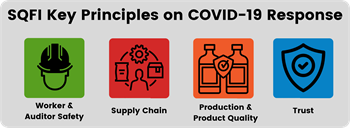SQFI Key Principles on COVID-19 Response
By GiGi Vita, Vice President of Sales & Marketing

From the onset, we have been deeply concerned by the impact of COVID-19 and its potential effect on the SQF community. We understand that companies face extraordinary operational challenges, and with every industry and business tested in unique ways, the course of action may be different for each.
Many companies have already stepped up to support their workers, customers, and local communities. SQFI together with the extensive resources within FMI– the Food Industry Association, has focused on many operational areas to combat the effects of COVID-19 on the food industry.
The SQF Community Has a Global Impact
Our community provides critical global food production and employs thousands of manufacturing and production-focused workers in more than 10,000 sites in more than 40 countries. Manufacturing facilities are an integral part of the world’s food supply chain. The SQF mission is to deliver consistent, globally recognized food safety and quality certification programs based on sound scientific principles, applied across all industry sectors, and valued by all stakeholders. The SQF Code is a food safety code for all sectors of the food supply chain from primary production through to food retailing and the manufacture of food packaging.
Focused on worker safety, compliant management, comprehensive controls and good manufacturing practices, SQFI has comprehensively approached this crisis. The manufacturing facility environment—production or assembly lines and other areas in busy plants where workers have close contact with coworkers and supervisors—may contribute substantially to workers’ potential disease exposures.
While it’s highly unlikely to contract COVID-19 from food or food packaging, now more than ever it is important for the food industry to have Food Safety Management Systems (FSMS) based on Hazard Analysis and Critical Control Point (HACCP) principles in place to manage food safety risks and prevent food contamination.
Evaluating Risk and Moving Audits Forward
At the heart of the SQF certification is the audit process. The site audit is conducted at the facility and determines the effective implementation of the site’s documented SQF food safety system. Due to the pandemic, many facilities have adopted no visitor policies. To this end, SQFI has implemented processes for risk assessments and if needed, can extend audits. To date, we have approved more than 1,200 requests for audit extensions and will continue to evaluate extensions presented by the SQF Certified Bodies.
The SQF key focus areas for the COVID-19 response is:
- Worker & Auditor Safety
We embrace a food safety culture focused on worker safety. Within the SQF Code, we point to good manufacturing practices to include management commitments, sanitary facilities, premise and equipment maintenance, cleaning and sanitization, good personnel processing practices and personnel hygiene and welfare. For SQF auditors, we place safety first. We understand and continue to monitor restrictions on travel and general business continuity that limit our ability to conduct audits.
- Production & Product Quality and Supply chain
With the continued global spread of COVID-19 affecting manufacturers, the abnormal closure and reopening of production facilities will increase supply chain pressures. In such times it can be easy to overlook quality and compliance processes in order to meet deadlines. The SQF technical team along with the auditor and certifying body community are working hard to monitor risk assessments, audit results and scores to identify and share best practices.
- Trust
Consumers want every assurance that their food retailers work with suppliers that have a trusted supply chain focused on food safety. SQF Auditors have provided us feedback that during this COVID-19 time, they see production facilities successfully stepping up to handle COVID-19 because they have a strong foundation built on SQF over the years. The principles of SQF provide this trusted strong base.
Navigating this global pandemic and all of its effects is a combined effort. We rely on the Certifying Bodies, the Auditors, Training Centers and the production facilities. We appreciate our community and we urge you to remain in touch with us to help communicate and identify challenges.
Recent Blog Posts
Renee McVey is one of the first industry professionals to hold the Safe Quality Food Institute’s new Certified SQF Practitioner credential, which is administered by Exemplar Global.
The Safe Quality Food Institute announces ASI Food Safety's Stacey Brown and Redbarn Pet Products' Renee McVey as recipients of the 2025 SQF Excellence Awards.
I’m thrilled to share an update on our journey in developing SQF Code Edition 10—a process built on collaboration, transparency, and shared industry insights.




